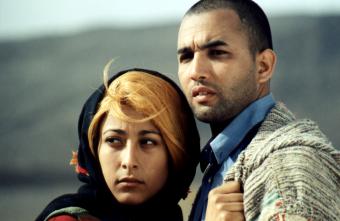 |
MEKTOUB Schicksal Destiny Nabil Ayouch Marokko/Frankreich 1997 Produktion: Shem's Production (Marokko), Playtime (Frankreich). Weltvertrieb: Playtime, 94, rue Saint Denis, 75001 Paris. Tel.: (33-1) 4026 7400, Fax: (33-1) 4026 7401. e-mail: playtime@club-internet.fr Regie: Nabil Ayouch. Buch: Nabil Ayouch, Youssef Fadel. Kamera: Vincent Mathias. Ausstattung: Barbara Nectoux. Musik: Henri Agnel. Mischung: Emmanuel Crozet. Maske: Leila Benbrahim. Ton: FranÁois Guillaume. Schnitt: Jean-Robert Thomann. Skript: SÈverine Siaut. Produzenten: Mohamed Badri, Habiba Guessous. Darsteller: Rachid El Ouali (Taoufik), Amal Chabli (Sophia), Faouzi Bensaidi (Kamel), Mohamed Miftah (Kebir), Tsouli (Chef), Mohamed Zouhair (Tabet). Format: 35mm (aufgeblasen von Super16), 1:1.66, Farbe. Länge: 92 Minuten, 24 B/sek. Sprache: Arabisch. |
Delphi-Filmpalast Fr.12.02.1999 11.00 Akademie der Künste Fr.12.02.1999 22.15 |
|
|
Nach zehnjährigem Studium in den Vereinigten Staaten kehrt der Arzt Taoufik nach Marokko zurück, um eine Praxis zu eröffnen. Er nutzt eine Reise nach Tanger, um dort mit seiner Frau Sophia den ersten Hochzeitstag zu feiern. Aus diesem Anlaß überreicht der Hoteldirektor dem jungen Paar eine Flasche Champagner, nach dessen Genuß Taoufik jedoch starke Vergiftungssymptome zeigt. Sophia macht sich mitten in der Nacht auf die Suche nach einem Notarzt. Unterwegs wird sie entführt und in eine Wohnung in der Altstadt gebracht, wo ein Mann sie mysteriösen Personen ‘anbietet’. Am nächsten Vormittag ist sie wieder im Hotel, und ihr Mann begreift, was passiert ist. Fassungslos nimmt er daraufhin Kontakt zu seinem Bruder Kamel auf, einem Polizeiinspektor in Tanger, den er zehn Jahre nicht gesehen hat. Aber der alte Familienzwist steht auch jetzt noch zwischen den beiden Männern. Als klar wird, daß von Kamel keine Unterstützung zu erwarten ist, nimmt Taoufik zusammen mit Sophia die Nachforschungen selbst in die Hand. „Vor fünf Jahren hätte ich diesen Film wahrscheinlich noch nicht machen können. Aber in Marokko hat sich die Situation in mancher Hinsicht sehr zum Positiven verändert. Wir Filmemacher haben heute mehr Handlungsspielraum, wenn wir ein heikles gesellschaftspolitisches Thema anpacken wollen wie z.B. die Korruption im Polizeiapparat.” Nabil Ayouch |
The
young and brilliant physician, Taoufik, returns to Morocco to open a practice
after studying in the United States for ten years. During a trip to Tangiers,
where he attends a conference for eye specialists, he and his wife Sophia
celebrate their first wedding anniversary. The hotel director presents
them with a bottle of champagne to celebrate the event, but after drinking
it, Taoufik displays symptoms of poisoning. In the middle of the night,
Sophia searches for an emergency doctor. She is abducted and brought to
an apartment in the inner city where a man 'offers' her to mysterious
men. The next day she is back at the hotel and her husband understands
what has happened. Stunned, he contacts his older brother Kamel, a police
inspector in Tangiers, whom he hasn't seen in ten years. But the old family
feud still lingers between the two men. When it becomes apparent that
Kamel can not help them, Taoufik and Sophia carry out the investigation
themselves. A country recognizes itself (...) Police corruption - this
is not an unusual topic for a European or an American film. But MEKTOUB
is a Moroccan film. It isn't at all usual in Morocco to talk publicly
about corruption. Five years ago I couldn't have made the film, says
the director. But much has changed for the better in Morocco. We filmmakers
have greater scope to deal with sensitive political issues. MEKTOUB
deals with several sensitive issues at once. In addition to police corruption
the film describes the situation of cannabis farmers in Morocco's North
- a highly ambivalent topic. Of course, the possession and sale of drugs
are severely punished, and furthermore, the government is under pressure
from the EU and the USA to decrease cannabis production. On the other
hand, cannabis farming and drug export are a significant economic factor.
The cannabis problem, reports Nabil Ayouch, had been fiercely debated
by the censors of the governmental 'control commission'. It is remarkable,
then, that the film remained unchanged and that nothing was cut. (...)
|
| Biofilmographie
/ Biofilmography Nabil Ayouch wurde 1969 geboren und arbeitete 1989 zum ersten Mal als Produktionsleiter für Werbefilme. Als er 1992 ins Regiefach überwechselte, hatte er bereits bei ca. fünfzig Werbespots für Marokko, Schwarzafrika und die französischen Überseegebiete (Dom-Tom) mitgearbeitet. 1992 entstand sein erster Kurzfilm, Les pierres bleues du dèsert (21 Minuten), 1993 ein weiterer mit dem Titel Hertzienne Connexion (4 Minuten), 1994 Vendeur de silence (26 Minuten). MEKTOUB ist sein erster abendfüllender Spielfilm. Nabil Ayouch was born in 1969. In 1989 he worked for the first time as a production manager for advertising films. When he changed to directing in 1992, he had already worked on about 50 advertising spots for Morocco, Africa and the French overseas provinces (Dom-Tom). In 1992 he made his first short film The Blue Desert Stones (21 minutes), and in 1993 another film Vendeur de silence (26 minutes). MEKTOUB is his first feature-length film. |
|